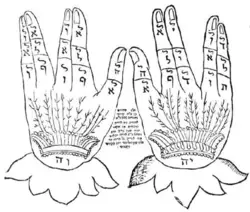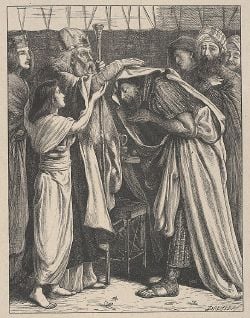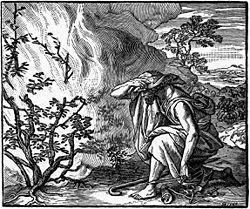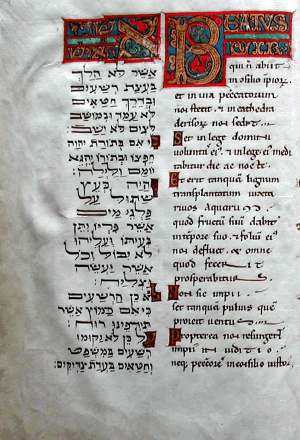Names of God in Judaism
| Category |
| Jews · Judaism · Denominations |
|---|
| Orthodox · Conservative · Reform |
| Haredi · Hasidic · Modern Orthodox |
| Reconstructionist · Renewal · Rabbinic · Karaite |
| Jewish philosophy |
| Principles of faith · Minyan · Kabbalah |
| Noahide laws · God · Eschatology · Messiah |
| Chosenness · Holocaust · Halakha · Kashrut |
| Modesty · Tzedakah · Ethics · Mussar |
| Religious texts |
| Torah · Tanakh · Talmud · Midrash · Tosefta |
| Rabbinic works · Kuzari · Mishneh Torah |
| Tur · Shulchan Aruch · Mishnah Berurah |
| Ḥumash · Siddur · Piyutim · Zohar · Tanya |
| Holy cities |
| Jerusalem · Safed · Hebron · Tiberias |
| Important figures |
| Abraham · Isaac · Jacob/Israel |
| Sarah · Rebecca · Rachel · Leah |
| Moses · Deborah · Ruth · David · Solomon |
| Elijah · Hillel · Shammai · Judah the Prince |
| Saadia Gaon · Rashi · Rif · Ibn Ezra · Tosafists |
| Rambam · Ramban · Gersonides |
| Yosef Albo · Yosef Karo · Rabbeinu Asher |
| Baal Shem Tov · Alter Rebbe · Vilna Gaon |
| Ovadia Yosef · Moshe Feinstein · Elazar Shach |
| Lubavitcher Rebbe |
| Jewish life cycle |
| Brit · B'nai mitzvah · Shidduch · Marriage |
| Niddah · Naming · Pidyon HaBen · Bereavement |
| Religious roles |
| Rabbi · Rebbe · Hazzan |
| Kohen/Priest · Mashgiach · Gabbai · Maggid |
| Mohel · Beth din · Rosh yeshiva |
| Religious buildings |
| Synagogue · Mikvah · Holy Temple / Tabernacle |
| Religious articles |
| Tallit · Tefillin · Kipa · Sefer Torah |
| Tzitzit · Mezuzah · Menorah · Shofar |
| 4 Species · Kittel · Gartel · Yad |
| Jewish prayers |
| Jewish services · Shema · Amidah · Aleinu |
| Kol Nidre · Kaddish · Hallel · Ma Tovu · Havdalah |
| Judaism & other religions |
| Christianity · Islam · Catholicism · Christian-Jewish reconciliation |
| Abrahamic religions · Judeo-Paganism · Pluralism |
| Mormonism · "Judeo-Christian" · Alternative Judaism |
| Related topics |
| Criticism of Judaism · Anti-Judaism |
| Antisemitism · Philo-Semitism · Yeshiva |
In Judaism, the name of God represents the Jewish conception of the divine nature, and of the relation of God to the Jewish people.
In the biblical text, the most frequent name used for God is "YHWH," also called the tetragrammaton, and usually translated as "the Lord" or "Jehovah." Contemporary scholarship often refers to this name, which is not pronounced or spelled out by most religious Jews, as Yahweh. The second most frequently used name for God in the Bible is Elohim, usually translated as "God." Other biblical names for God include "El," "El Shaddai" (God Almighty), and "El Elyon," (God Most High).
Jewish tradition usually substitutes the word Adonai ("Lord") for God's name when in liturgical use. In everyday language, the word Hashem ("The Name") is also commonly used. Orthodox Jews do not even spell out the word "God," using the term "G-d" instead to emphasize that no human word can capture the divine essence. Kabbalistic tradition makes more direct use of the sacred names of God, using them both as a means to mystical enlightenment, and, in some cases to achieve magical effects.
Seven Names of God
In medieval times, God was sometimes called The Seven, referring to the seven major names by which he was known among the Jews. Each of the names was considered sacred. The seven names for the deity over which the ancient scribes were instructed to exercise particular care were:
- YHWH (i.e. Jehovah)
- El
- Elohim
- Adonai
- Ehyeh-Asher-Ehyeh
- Shaddai
- Sabaoth
Biblical names of God
Yahweh
The most important and most often written name of God in the Hebrew Bible, the Tetragrammaton, is spelled in Hebrew as יהוה (YHWH) and rendered in modern English as Yahweh. The word "Tetragrammaton" derives from the Greek prefix tetra- ("four") and gramma ("letter"). By some counts, the Tetragrammaton appears 6828 times in the Masoretic text of the Hebrew Bible. This name is first mentioned in Genesis 2:4.
In English language bibles, YHWH is traditionally translated as "The Lord." Rabbinical Judaism forbids pronouncing the name outside the Temple in Jerusalem, although some kabbalistic traditions disagree.
Because the original Hebrew texts only included consonants, the correct pronunciation of the Tetragrammaton may have been lost. Some conjecture that it was pronounced as "Yahweh" or something similar, but others suggest that it never had a pronunciation. However, it is found as an element in numerous Hebrew names such as the first syllable in Joshua or Jesus (both of which were pronounced "Yeshua") or the last syllable Elijah, Isiaiah, etc.
The Hebrew letters of the Tetragrammaton are Yod-Heh-Vav-Heh—יהוה—written right to left and transliterated in English as YHWH, YHVH, or JHVH. The word "YHWH" is the third person singular imperfect of the verb "to be," meaning, literally, "He is." This conforms with the meaning of the name given in Exodus 3:14, where God is represented as giving his name in the first person—"I am."
The translation of YHWH as "Jehovah" was created by adding the vowel points of "Adonai" (Lord), which Jews normally use to avoid pronouncing the sacred name in their prayers, and which therefore appear in Hebrew versions of the scriptures. Early Christian translators of the Hebrew Bible were apparently unaware that in Jewish tradition these vowel points only served to remind the reader not to pronounce the divine name, but instead say "Adonai." These translators took the letters "IHVH," from the Latin Vulgate version of the Bible, plus the vowels "a-o-a," rendering the word as "Iahovah" in sixteenth-century English, which later became "Jehovah."
Substituting Adonai for YHWH apparently dates back at least to the third century B.C.E.[1] However, some passages indicated that the name was actually spoken:
"And, behold, Boaz came from Bethlehem, and said unto the reapers, YHWH [be] with you. And they answered him, YHWH bless thee" (Ruth 2:4).
Moreover, the Book of Genesis indicates that the patriarchs dating back to the time of Seth "called upon the Name of YHWH."
Elohim
Another frequently used name of God in the Hebrew Bible is Elohim (Hebrew: אלהים). In English Bibles this word is normally translated as "God." Despite the -im ending common to plural nouns in Hebrew, Elohim, when referring to God, is grammatically singular.
In modern biblical scholarship, the documentary hypothesis holds that the use of Yahweh in certain parts of the Book of Genesis and the use of Elohim or El in others represents the presence of two or more distinct sources. In the southern "J" source, the patriarchs knew Yahweh's true name from the earliest times, while in the northern "E" and later "P" sources, the the term El or Elohim is used until the calling of Moses just prior to the Exodus.
In Canaanite mythology, the divine offspring of the god El were called el'm, probably vocalized as "elohim," although the original Ugaritic vowels are unknown. When the Hebrew Bible uses elohim not in reference to God, translators render the term as "the gods."[2]
El
El was the God of Abraham, Isaac, and Jacob, and also the chief god of the ancient Canaanites. Exodus 6:3 explains that Yahweh was originally known to the Israelites as "El Shaddai" (God Almighty), and the Canaanite king Melchizedek shared a sacramental with Abraham in the name of El Elyon (Genesis 14:18).
Examples of the biblical use of El as the Israelite deity with some attribute or epithet are: El `Elyon ("Most High God"), El Shaddai ("God Almighty"), El `Olam ("Everlasting God"), El Hai ("Living God"), El Ro'i ("God of Seeing"), El Elohe Israel ("God, the God of Israel"), El Gibbor ("God of Strength"). The important ancient religious center of Bethel means "house (or place) of El."
In Canaanite texts, El is identified as the chief god, consort of Asherah, and the father of many other deities, including Baal. The name El appears in several northwest Semitic languages, such as Phoenician, Ugaritic, and Aramaic. In Akkadian, ilu is the ordinary word for god. It is also found in Old South Arabian and in Amharic/Ethiopian.
In Hebrew, it is often used as an element in proper names, such as Gabriel ("Strength of God"), Michael ("He Who is Like God"), Raphael ("God's medicine"), Daniel ("God is My Judge"), and Israel ("one who has struggled with God"), and many others.
Shaddai
According to Exodus 6:2-3, El Shaddai is the name by which God was known to Abraham, Isaac, and Jacob. The term may be recognized in most English Bibles as "God Almighty." The name Shaddai (Hebrew: שַׁדַּי) is also used as a name of God later in the Book of Job.
One theory about the term is that Shaddai is a derivation of the Akkadian shadû ("mountain") or shaddû`a ("mountain-dweller"), one of the names of the Amorite god Amurru. Shaddai was also a late Bronze Age Amorite city on the banks of the Euphrates river, in northern Syria. In this theory, El Shaddai is seen as inhabiting a mythical holy mountain, as well as the sacred high places of early Israelite religion such as Bethel, Mount Carmel, and others. He was once identical with the Hebrew God, who later came to be identified with Yahweh.
`Elyon
God as "El Elyon" was the common deity of Abraham and Melchizedek in Genesis 14. Fascinatingly, Deuteronomy 32:8-9 preserves a tradition in which Elyon—the Most High—seems to have assigned the national deity Yahweh to his people Israel:
- When the Most High gave the nations their inheritance,
- when he divided all mankind,
- he set up boundaries for the peoples
- according to the number of the sons of Israel.
- For the Lord's portion is his people,
- Jacob his allotted inheritance.
The epithet `Elyon (Hebrew: עליון) occurs in combination with El, YHWH, or Elohim, and also alone. The modern Hebrew adjective "`Elyon" means "supreme" (as in "Supreme Court") or "Most High." El Elyon is traditionally translated into English as "God Most High," while Elyon alone is rendered as "The Most High." The Phoenicians used what appears to be a similar name for God, Έλιον. It is cognate to the Arabic `Aliyy.
Later Names


Adonai
In speaking aloud, Jews often call God Adonai, Hebrew for "Lord" (Hebrew: אֲדֹנָי). Technically, this form, like Elohim, is plural, but is normally treated as singular for syntactic purposes.
The singular form is Adoni, "my lord." This name was also used by the Phoenicians for the god Tammuz and is the origin of the Greek name Adonis. Jews also used the singular to refer to a distinguished person, just as the English word Lord is used.
Hashem
It is common Jewish practice to even restrict the use of the word Adonai to prayer or liturgical readings. In conversation, many Orthodox Jews will call God Hashem, which is Hebrew for "the Name" instead (see Leviticus 24:11).
Shalom
The Talmud says "the name of God is 'Peace'" (Pereq ha-Shalom, Shab. 10b), (Judges 6:24). The name Shlomo, "His peace" (from shalom, Solomon, שלומו), refers to the God of Peace. Shalom can also mean "hello" and "goodbye."
Because the name of God is holy, for many Jews, one is not permitted to greet another with the word shalom in unholy places such as a bathroom (Talmud, Shabbat, 10b).
The Shekhinah
Shekhinah (Hebrew: שכינה) is the presence or manifestation of God which has descended to "dwell" among humanity. The term never appears in the Hebrew Bible, but later rabbis used the word when speaking of God dwelling either in the Tabernacle or among the people of Israel. Of the principal names of God, it is the only one that is of the feminine gender in Hebrew grammar. Many hold that the Shekhinah refers to God's feminine aspect.
YHWH Tzevaot/Sabaoth
The names YHWH and Elohim frequently occur with the word tzevaot or sabaoth ("hosts" or "armies") attached. This name is traditionally transliterated in Latin as Sabaoth, a form that was used in the King James Version of the Bible. More frequently today, it is rendered as "God/Lord of hosts." This compound divine name occurs chiefly in the prophetic literature and does not appear at all in the Pentateuch, Joshua or Judges.
Ehyeh-Asher-Ehyeh
"I am that I am" (Hebrew: אהיה אשר אהיה, pronounced Ehyeh asher ehyeh) is the sole response used in (Exodus 3:14) when Moses asked for God's name. It is one of the most famous verses in the Hebrew Bible. Ehyeh asher ehyeh is generally interpreted to mean "I will be what I will be," or I am that I am. The Tetragrammaton itself derives from the same verbal root. The name Ehyeh (Hebrew: אֶהְיֶה) denotes God's potency in the immediate future, and is traditionally considered to be part of YHWH.
Lesser names of and titles
- Adir—"Strong One."
- Adon Olam—"Master of the World."
- Avinu Malkeinu—"Our Father, our King."
- Boreh—"the Creator."
- Ehiyeh sh'Ehiyeh—"I Am That I Am": a modern Hebrew version of "Ehyeh asher Ehyeh."
- Elohei Avraham, Elohei Yitzchak ve Elohei Ya`aqov—"God of Abraham, God of Isaac, God of Jacob."
- El ha-Gibbor—"God the hero" or "God the strong one."
- Emet—"Truth."
- E'in Sof—"endless, the Void, infinite," Kabbalistic name of God.
- Ro'eh Yisra'el—"Shepherd of Israel."
- Ha-Kaddosh, Baruch Hu—"The Holy One, Blessed be He."
- Kaddosh Israel—"Holy One of Israel."
- Melech ha-Melachim—"The King of Kings" or Melech Malchei ha-Melachim "King of Kings of Kings," to express superiority to the earthly rulers title.
- Makom or Hamakom—literally "the place," meaning "The Omnipresent."
- Magen Avraham—"Shield of Abraham."
- Ribbono shel `Olam—"Master of the World."
- YHWH-Rapha—"The Lord that healeth" (Exodus 15:26).
- YHWH-Niss"i (Yahweh-Nissi)—"The Lord our Banner" (Exodus 17:8-15).
- YHWH-Shalom—"The Lord our Peace" (Judges 6:24).
- YHWH-Ra-ah—"The Lord my Shepherd" (Psalm 23:1).
- YHWH-Tsidkenu—"The Lord our Righteousness" (Jeremiah 23:6).
- YHWH-Shammah(Jehovah-shammah)— "The Lord is present" (Ezekiel 48:35).
- Tzur Israel—"Rock of Israel."
Kabbalistic use
The kabbalistic book Sefer Yetzirah explains that the creation of the world was achieved by the manipulation of the sacred letters that form the names of God. Some kabbalistic rabbis permitted the pronunciation of the tetragrammaton for use in "practical kabbalah," which sought to achieve enlightenment or alter reality through the chanting of kabbalistic formulas. In the same way, a golem—an animated being created entirely from inanimate matter—was said to be created by using all permutations of God's name.
The system of cosmology of the Kabbalah deals extensively with several of the names of God. The 72-lettered name shown in the accompanying illustration is based on three verses in Exodus (14:19-21) beginning with "Vayyissa," "Vayyabo," "Vayyet," respectively. Each of the verses contains 72 letters, and when combined they form 72 names, known collectively as the Shemhamphorasch. A 42-lettered kabbalistic name of God contains various combinations of the names אהיה יהוה אדוני הויה, which when spelled out contains 42 letters.
One of the most important kabbalistic names of God is En Sof—אין סוף ("Infinite" or "Endless")—who is above/beyond the Sefirot or emanations of God.
Laws of writing the divine names
According to Jewish tradition, the sacredness of the divine names must be recognized by the professional scribe who copies the scriptures, or inscribes the tiny scrolls inserted in the tefillin and the mezuzah. Before transcribing any of the divine names the scribe must prepare mentally to sanctify them. Once he begins a name he does not stop until it is finished, and he must not be interrupted while writing it, even to greet a king. If an error is made in writing it, it may not be erased, but a line must be drawn round it to show that it is canceled, and the whole page must be put in a genizah (burial place for scripture), and a new page begun.
See also
Notes
- ↑ Harris, 1985.
- ↑ Occasionally this leads to controversy, as in the case of King Jeroboam I saying "here is elohim, O Israel." Does he mean, "here is God," or "here are your gods?" (1 Kings 12:28)
ReferencesISBN links support NWE through referral fees
- Albright, William Foxwell. Yahweh and the Gods of Canaan; A Historical Analysis of Two Contrasting Faiths. Garden City, N.Y.: Doubleday, 1968. OCLC 442518
- Berg, Yehudah. The 72 Names of God: Technology for the Soul. New York: Kabbalah Pub, 2003. ISBN 9781571891358
- Burnett, Joel S. A Reassessment of Biblical Elohim. Atlanta, GA: Society of Biblical Literature, 2001. ISBN 9781589830165
- Harris, Stephen L. Understanding the Bible: A Reader's Introduction. Palo Alto, Calif: Mayfield Pub. Co, 1985. ISBN 087484696X
- Hoffman, Joel M. In the Beginning A Short History of the Hebrew Language. New York: New York University Press, 2004. ISBN 0814736548
- Parke-Taylor, G. H. Yahweh: The Divine Name in the Bible. Waterloo, Ont: Wilfrid Laurier University Press, 1975. ISBN 9780889200135
External links
All links retrieved June 2, 2025.
- Why don't you spell out G-d's name? www.chabad.org
- Jewish Encyclopedia: Names of God jewishencyclopedia.com
Credits
New World Encyclopedia writers and editors rewrote and completed the Wikipedia article in accordance with New World Encyclopedia standards. This article abides by terms of the Creative Commons CC-by-sa 3.0 License (CC-by-sa), which may be used and disseminated with proper attribution. Credit is due under the terms of this license that can reference both the New World Encyclopedia contributors and the selfless volunteer contributors of the Wikimedia Foundation. To cite this article click here for a list of acceptable citing formats.The history of earlier contributions by wikipedians is accessible to researchers here:
The history of this article since it was imported to New World Encyclopedia:
Note: Some restrictions may apply to use of individual images which are separately licensed.




